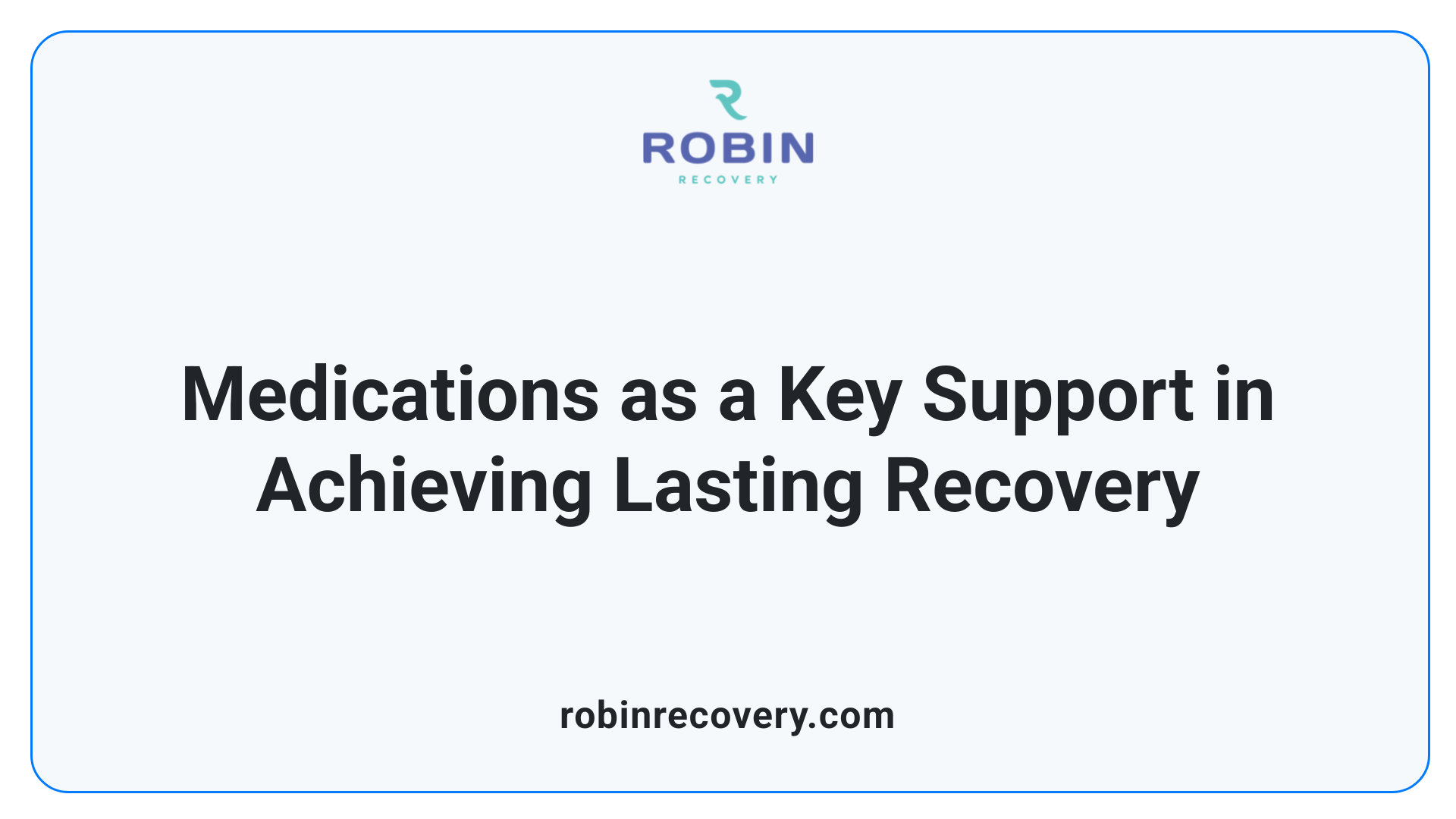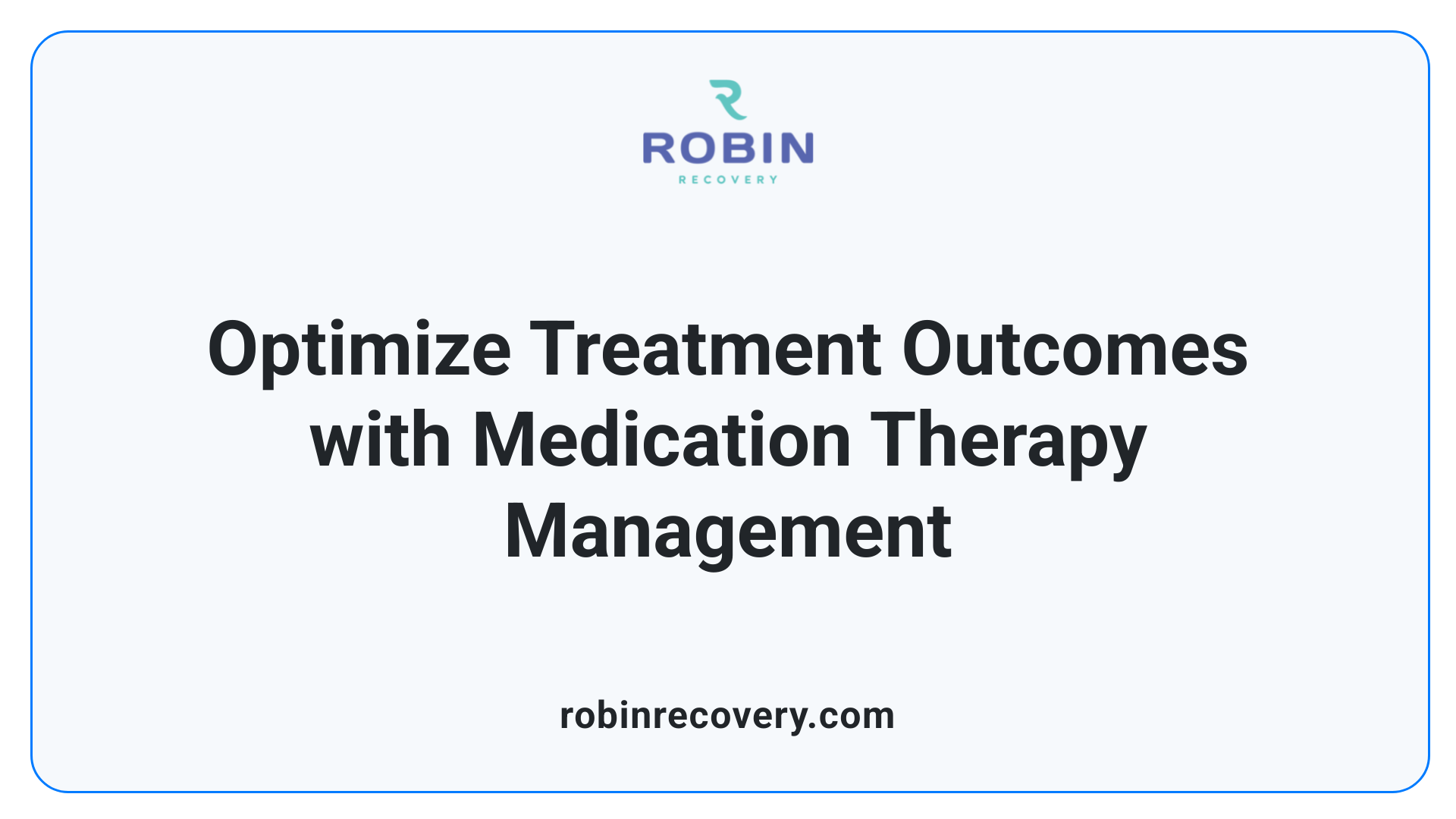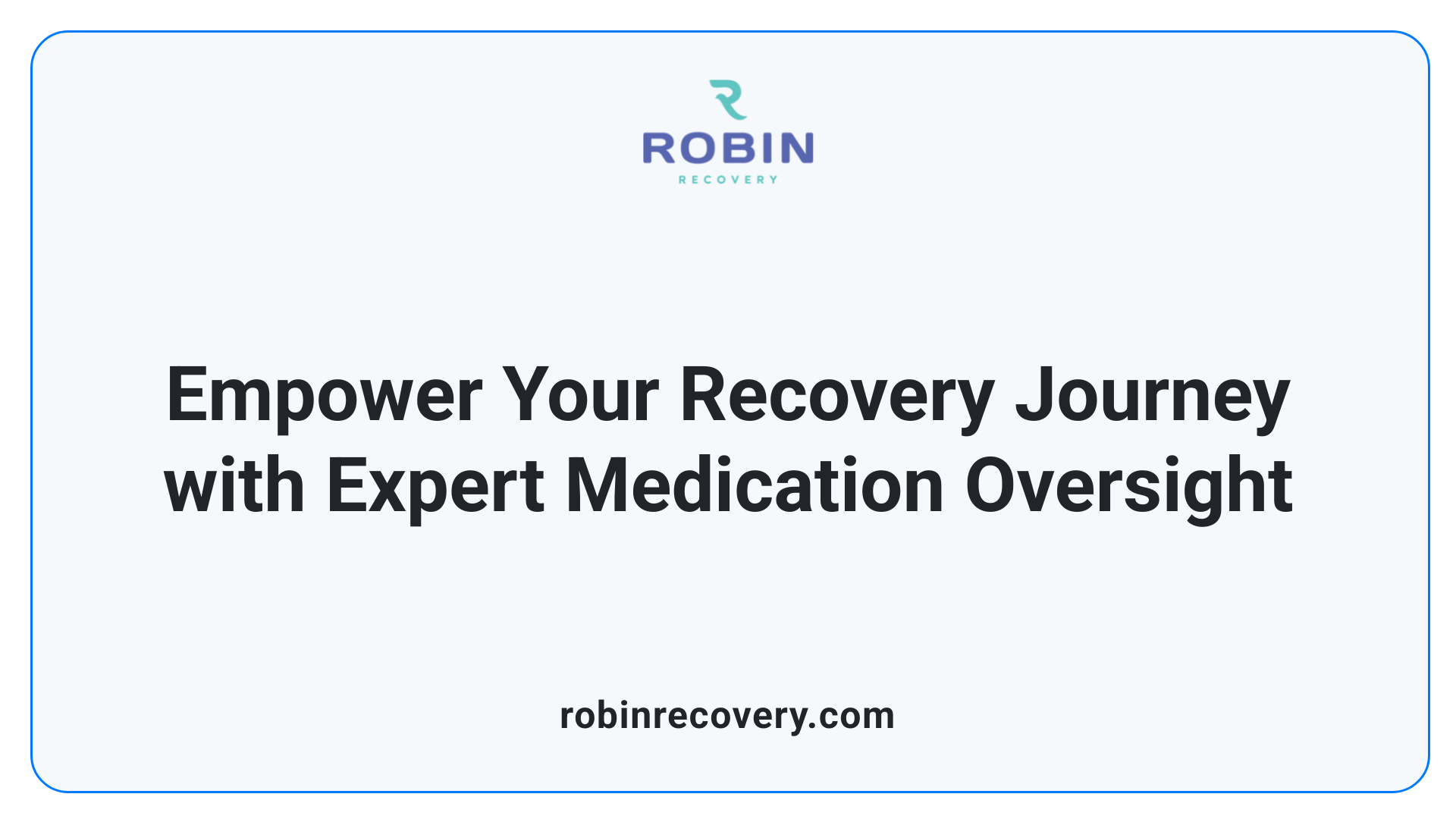The Importance of Medication Management in Addiction Recovery

Introduction to Medication Management in Addiction Recovery
Medication management is a cornerstone of effective addiction treatment, ensuring that prescribed drugs are used safely, appropriately, and tailored to individual needs. When combined with behavioral therapies, this comprehensive approach addresses both the physical and psychological aspects of addiction, supporting sustained recovery and reducing relapse risks.
The Role of Medications in Supporting Addiction Recovery

Use of FDA-approved medications for substance use disorders
Medications approved by the Food and Drug Administration (FDA) are vital in treating substance use disorders. For opioid addiction, medications like buprenorphine, methadone, and naltrexone are commonly prescribed. Similarly, for alcohol dependence, drugs such as acamprosate, disulfiram, and naltrexone are utilized. These medications are tailored to meet individual needs, helping to manage withdrawal symptoms, reduce cravings, and support abstinence.
How medications reduce cravings and manage withdrawal symptoms
Medications play a critical role in easing the detox process by alleviating withdrawal symptoms that can be intense and discouraging. For example, methadone and buprenorphine help reduce opioid withdrawal discomfort, encouraging individuals to stay in treatment. Naltrexone blocks the euphoric effects of opioids and alcohol, decreasing the desire to relapse. These medicines also stabilize brain chemistry, making behavioral therapies more effective.
Medications’ contribution to improving patient survival and treatment retention
Using FDA-approved medications significantly increases survival rates among individuals with substance use disorders. They help prevent overdose, especially in opioid addiction, by normalizing brain function and reducing the risk of accidental death. Medications enhance retention in treatment programs, making it more likely that individuals will complete therapy and sustain recovery. They also decrease illicit drug use, criminal activity, and improve broader life outcomes such as employment and prenatal health.
Why is medication management important in addiction treatment?
Medication management is crucial because it ensures medications are used safely and effectively. This process involves close oversight by healthcare professionals who monitor for side effects, drug interactions, and treatment progress. Proper management helps prevent adverse events, like overdose or medication misuse, and allows for necessary adjustments based on individual responses. It also promotes adherence to the treatment plan, which is essential for lasting recovery.
Supporting recovery through combined therapy and medication
Effective addiction treatment integrates medication with behavioral therapies such as cognitive-behavioral therapy and family involvement. This holistic approach addresses both the physical and psychological facets of addiction, increasing the likelihood of long-term success. Medications are not a standalone cure but complement counseling by reducing withdrawal discomfort and cravings, enabling individuals to engage more fully with therapeutic strategies.
Medication Type Addiction Focus Approvals & Uses Additional Notes Buprenorphine Opioid Use Disorder Office-based prescribing Helps reduce cravings and withdrawal Methadone Opioid Use Disorder Specialized clinics Long-acting full agonist Naltrexone Opioid & Alcohol Use Disorder Injection & oral Blocks effects of opioids and alcohol Acamprosate Alcohol Use Disorder Oral Stabilizes brain chemistry Disulfiram Alcohol Use Disorder Oral Causes unpleasant effects when alcohol is consumed
This integrated strategy of medication and therapy provides a comprehensive framework to support individuals in overcoming addiction, leading to healthier lives and sustained recovery.
Benefits and Outcomes of Medication Management

What are the benefits of medication management in preventing relapse?
Medication management is essential in reducing the risk of relapse among individuals recovering from substance use disorders. By ensuring the correct and consistent use of FDA-approved medications like disulfiram, naltrexone, acamprosate, methadone, and buprenorphine, it targets the core drivers of relapse: cravings and withdrawal symptoms.
Effective management involves regular monitoring and dose adjustments, helping to tailor treatment to each person’s evolving needs. This careful oversight not only minimizes side effects but also enhances medication safety and efficacy.
When medication is combined with behavioral therapy, the chances of maintaining abstinence improve significantly. Medications help stabilize the brain and body, making individuals more receptive to therapy and other recovery strategies.
Overall, proper medication management offers a reliable, evidence-based method to support long-term sobriety, improve mental health, and enhance overall quality of life. It provides structure, safety, and individualized care—critical components in the journey of recovery.
How does medication management enhance mental health and stability?
Medication management plays a crucial role in stabilizing symptoms of mental health conditions often co-occurring with addiction, such as depression, anxiety, PTSD, or psychosis. Proper medication use helps regulate mood swings, reduce emotional dysregulation, and alleviate anxiety or depressive symptoms.
Stabilizing mental health allows individuals to participate actively in therapy and community support, which are key to sustained recovery. Regular assessment and adjustments by healthcare professionals ensure treatments remain effective and safe.
Moreover, managing mental health medications, such as antidepressants or antipsychotics, alongside addiction medications, creates a balanced approach. This harmony supports emotional well-being and reduces the stress that might trigger substance use.
Support for co-occurring mental health conditions
Co-occurring disorders require a comprehensive treatment plan that includes both addiction recovery and mental health care. Medication management provides the framework to address psychiatric symptoms safely while focusing on addiction recovery.
Using targeted medications, healthcare providers can control symptoms like anxiety, depression, or psychosis, which might otherwise hinder recovery efforts. Effectively managing these conditions decreases the likelihood of self-medication with substances and promotes a more stable life.
In conclusion, medication management is a vital component that enhances mental health, reduces relapse risks, and supports a holistic recovery process, offering individuals a better chance at achieving lasting sobriety and improved overall health.
The Significance of Professional Oversight and Safety in Medication Management

Why is professional oversight and safety consideration in medication management important?
Managing medications safely is vital in the treatment of substance use and co-occurring mental health disorders. Proper oversight minimizes risks of errors, adverse reactions, and complications that can jeopardize patient recovery.
Healthcare professionals follow strict protocols and verification processes to ensure the right medication, dose, and timing. These standardized procedures include careful review of prescriptions, double-checking dosages, and confirming patient identity before administering medications.
Technology plays a crucial role in enhancing safety. Tools such as barcode scanning, electronic medical records, and computerized ordering systems help prevent mistakes like incorrect medication or dose. These systems improve accuracy at every step, from prescribing to dispensing.
Monitoring for side effects and adverse reactions is an ongoing process. Healthcare providers regularly evaluate patient responses, adjusting medications when needed, and addressing any issues quickly to prevent complications.
Open communication among medical staff, patients, and caregivers strengthens safety. Clear instructions about medication use, potential side effects, and interactions help patients adhere to their treatment plans.
Additional safety measures include staff training on medication effects, proper storage, and handling of high-alert drugs. These steps protect vulnerable populations, such as pregnant women, children, and those with multiple health conditions.
An environment rooted in safety and vigilance not only reduces medication errors but also increases treatment success. When medication management is supported by professional oversight, patients experience better health outcomes, fostering trust in the recovery process.
Medication Therapy Management (MTM): A Comprehensive Approach

What is medication therapy management (MTM) and its purpose?
Medication therapy management (MTM) is a specialized clinical service offered primarily by pharmacists designed to optimize a patient’s medication regimen and prevent medication-related issues. It involves an in-depth review of all medications a patient uses, including prescriptions, over-the-counter products, and herbal supplements. This comprehensive review helps identify potential drug interactions, unnecessary medications, or adverse effects that could hinder recovery or compromise health.
MTM includes educating patients about their medications, creating personalized medication action plans, and providing ongoing monitoring to track treatment progress and side effects. It encourages collaboration between pharmacists, doctors, and other healthcare providers to ensure medications are used safely and effectively.
The main goal of MTM is to promote medication adherence, prevent avoidable adverse drug events, and effectively manage chronic conditions such as substance use disorders. By tailoring medication plans to each individual’s needs and circumstances, MTM enhances overall health outcomes and safeguards patient well-being.
Review of all medications including OTC and herbal supplements
A key component of MTM is a thorough review of all substances a patient consumes. This includes prescription drugs, over-the-counter medications, herbal remedies, dietary supplements, and vitamins.
Such a review helps in identifying potential interactions that could cause side effects or reduce the effectiveness of treatment. For instance, some herbal supplements may interfere with prescribed medications or exacerbate health conditions.
Healthcare providers, especially pharmacists, can then counsel patients to ensure safe use and inform about possible risks. This process supports comprehensive care, especially for individuals with complex medication regimens common in addiction recovery.
Reducing medication-related problems
Medication-related problems are common in individuals undergoing treatment for substance use disorders and mental health co-occurring conditions.
MTM aims to reduce issues such as incorrect dosages, duplicate therapies, and dangerous drug interactions. Proper management prevents potential overdoses, reduces side effects, and minimizes the risk of relapse triggered by medication complications.
Additionally, continuous monitoring allows providers to adjust doses or change medications as needed, preventing adverse reactions and enhancing treatment efficacy. This proactive approach is vital for individuals with complex needs, ensuring medications serve their intended purpose safely.
Collaboration with healthcare providers
Effective MTM depends heavily on collaboration among healthcare professionals. Pharmacists work closely with physicians, psychologists, and nurses to develop integrated treatment plans.
Open communication ensures that all aspects of a patient’s health—medical, psychological, social—are considered when managing medications. It also facilitates timely interventions, such as modifying a medication if side effects occur or addressing new health issues.
Patients benefit from this team-based approach, as it promotes consistency, safety, and personalized care. Regular updates and shared decision-making are crucial in maintaining optimal recovery trajectories.
Aspect Description Benefits Medication review Evaluating all prescribed, OTC, and herbal medicines Prevents interactions and adverse effects Monitoring Ongoing assessment of treatment response Ensures safety and efficacy Patient education Teaching about medication use and side effects Enhances adherence and safety Provider collaboration Coordinated care among healthcare team Supports comprehensive recovery
By integrating medication management with therapy and support services, MTM offers a holistic strategy. It helps individuals in addiction recovery not only to stop substance use but to sustain health and improve overall quality of life.
How Medication Management Supports Long-Term Recovery

How does medication management contribute to comprehensive addiction recovery programs?
Medication management is a vital component of successful addiction treatment, focusing on the careful oversight of prescribed medications to ensure safety, efficacy, and adherence. It involves regular assessment, dosing adjustments, monitoring for side effects, and clear communication between healthcare providers and patients.
In comprehensive recovery programs, medication management complements behavioral therapies by targeting the physical aspects of addiction. Approved medications such as methadone, buprenorphine, naltrexone, disulfiram, acamprosate, and others are prescribed to help manage withdrawal symptoms, reduce cravings, and prevent relapse. These medications support brain healing and help break the cycle of addiction.
Structured monitoring and adjustments allow healthcare providers to customize treatment plans based on individual progress and response. This includes evaluating medication effectiveness, managing side effects, and modifying dosages as needed. Such approach helps stabilize mental health, address co-occurring conditions, and reduce the risk of overdose.
Proper medication management also involves safe storage, proper administration, and adherence to prescribed regimens. It safeguards against accidental overdose—especially important in households with children—and ensures medications are used responsibly.
By integrating medication management into a broader treatment strategy, addiction programs can enhance patient engagement, improve health outcomes, and support sustained sobriety. Regular follow-up helps to refine treatment, manage any complications, and maintain motivation for long-term recovery.
Aspect of Management Description Benefit Monitoring & Adjustments Regular evaluations to optimize medication use Improved effectiveness & safety Mental Health Stabilization Use of psychiatric medications alongside addiction medications Better mood, reduced relapse Overdose Prevention Safe storage, proper use, and supervision Lower overdose risk
In short, medication management plays a critical role in supporting the physical and mental stability of individuals in recovery, making it an indispensable part of holistic addiction treatment programs.
Conclusion: Medication Management as a Pillar of Effective Recovery
Medication management is a fundamental component of successful addiction treatment. It ensures that FDA-approved medications are used safely and effectively to support detoxification, reduce cravings, and manage withdrawal symptoms. Proper oversight involves individualized dosing, continuous monitoring, and timely adjustments, which help optimize treatment results.
Combining medication with behavioral therapies and supportive services creates a comprehensive, 'whole-patient' approach. This integration addresses both the physical and psychological aspects of addiction, increasing the likelihood of sustained recovery. Therapies like cognitive-behavioral therapy or family counseling work in tandem with medications to modify attitudes and behaviors related to substance use.
Long-term medication management offers numerous benefits. It can improve mental health stability, decrease relapse rates, and support overall well-being. By reducing the risks of overdose and facilitating ongoing engagement in treatment, proper medication oversight enhances the chances for enduring sobriety. Regular evaluation and personalized adjustments keep treatment aligned with the individual's evolving needs, significantly boosting recovery success over time.
Emphasizing the Critical Role of Medication Oversight
In conclusion, medication management is an indispensable component of effective addiction recovery. Through professional oversight, it ensures safety, enhances treatment efficacy, and supports the long-term stability needed for sustained sobriety. When integrated with behavioral therapies and comprehensive support systems, medication management significantly improves outcomes, reduces relapse and overdose risks, and promotes overall well-being. Emphasizing safety and personalized care, it remains a vital pillar in addressing the complex needs of individuals battling addiction.
References
- Medications for Substance Use Disorders - SAMHSA
- Treatment and Recovery | National Institute on Drug Abuse (NIDA)
- 4 Benefits of Medication Management
- The Importance of Medication Management - Zelus Recovery
- The Importance of Therapy & Medication Management Together
- Medication Mangement | Relevance Recovery
- Medication Management - Apex Recovery
- How Managing Your Medication Will Benefit Addiction Recovery
- Medication Assisted Treatment (MAT) - American Addiction Centers
- Medication Management in Addiction Treatment | Encore Outpatient
